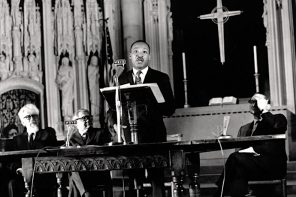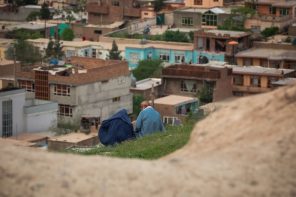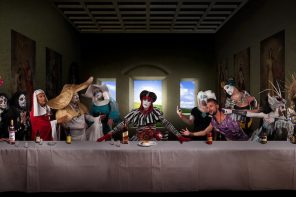On Monday we celebrated Martin Luther King Jr. Day and, the next morning, the swearing-in of the first black president of a country that once bought and sold Africans as slaves. The poignancy of this juxtaposition slaps us in the face with our own history. In both sequence and in significance, one day opens the door to the other.
The night of November 4 last year, I joined thousands of people celebrating in the streets of Harlem. As news of Barack Obama’s victory spread, we all knew something once thought impossible had just happened. The faith of so many generations, kept by those who did not live to see the day, prevailed upon the imaginary walls that stand between justice and the possible.
So where might faith lead next?
As the new president takes office, he presides over wars with no end in sight. In more than half a century as the world’s superpower, the United States has failed to offer an example of how to resolve disputes without recourse to violence. While pledging to reinvigorate diplomacy and withdraw troops from Iraq, Mr. Obama has also promised to swell the military’s ranks and kill more terrorists.
His hopes have been only so audacious against the status quo of militarism, leaving to us the sacred task of hoping and working more audaciously than he.
For the Sake of Those Boys
In both life and death, the limits of official imagination have split Dr. King’s legacy in two. In contrast to Malcom X, whose rhetoric electrified the urban ghettos of the same period, King’s commitment to nonviolent action made him available as a hero to the very institutions he opposed. When both houses of Congress passed a resolution honoring him in January 2007, they praised “a champion of nonviolence, fervently advocating nonviolent resistance as the strategy to end segregation and racial discrimination.” Diane Feinstein echoed the same in her remarks at Obama’s inauguration. Yet neither she nor the resolution mentioned the concern that came to dominate the later years of his short life: ending the Vietnam War. Washington can bless others’ courage to use nonviolence against itself, but not the demand that it wield the same strategy in its own conflicts.
On April 4, 1967, a year to the day before his death, King spoke out about Vietnam in an address at New York’s Riverside Church. He did so against the advice of his allies, both in politics and the civil rights movement. They told him that race and war were separate issues and that he might threaten progress in the one by stirring up trouble about the other. But he insisted. “I have moved to break the betrayal of my own silences,” said King at Riverside, “and to speak from the burnings of my own heart.”
It was through the struggle for civil rights that geopolitics became inescapable for him. “As I have walked among the desperate, rejected, and angry young men, I have told them that Molotov cocktails and rifles would not solve their problems,” he explained. “But they ask—and rightly so—what about Vietnam? They ask if our own nation wasn’t using massive doses of violence to solve its problems, to bring about the changes it wanted.” Nonviolence on American streets and the massacre in Vietnam represented an impossible contradiction that no political convenience could soothe. “For the sake of those boys, for the sake of this government, for the sake of the hundreds of thousands trembling under our violence, I cannot be silent.”
The Weapon of the Weaponless
King is not the only nonviolent resister to have been sanitized for the use of violent governments. The independence struggle of Gandhi himself became the inheritance of Hindu nationalists who have carried on hostilities with neighboring Pakistan for decades, even while erecting statues of the Mahatma in villages all over the country. The West hailed unarmed uprisings against Soviet rule in Eastern Europe but didn’t take its ICBMs off alert for a second. On the back cover of A Force More Powerful, a book by Peter Ackerman and Jack Duvall that documents nonviolent movements throughout the last century, no less than John McCain has a blurb. He says, “I recommend it to anyone who believes that power only flows from the barrel of a gun.” Yet such an endorsement didn’t cause him to think twice before betting his presidential campaign on a military solution to the quagmire in Iraq.
Along with nuclear weapons, aerial bombing, suicide terrorism, and extermination camps, successful and nonviolent resistance movements were part of the 20th century’s eternal contribution to human history. Gandhi, King, Mandela, Havel, and others sharpened a set of tools that have changed the whole nature of human conflict. With a stalwart commitment not to destroy even their enemies, they won justice for their communities and earned universal respect for doing so. Yet, in each case, nonviolence was the weapon of the weaponless. Those with weapons, the United States in particular, used them. What remains for the 21st century is to show that the powerful, too, can choose to truly resolve disputes rather than futilely trying to obliterate them.
The God of All of Us
Barack Obama, like Martin Luther King Jr., has found powerful resources of hope in the black church. “We shall live in peace someday,” sang civil rights protesters, even as they stood before nightsticks and police dogs. This tradition emerged from the impossible task of being human under the inhumanity of slavery. Giving too much credence to the possible wasn’t an option, and faith was the only habitable reality. Today, in its songs and saints, part of this deep reserve can be all of our inheritance. It cries out for what we have overcome and what we must overcome.
The decision to adopt nonviolence on a national scale, too, has to be a religious act, a leap into the never-before-seen. Recent history offers evidence that nonviolence can solve conflicts with powerful opponents, but only when you oppose them with love. Elected leaders have the power choose to put aside arms, but they can only do it with the faith of their supporters at home. Maybe someday nonviolence will be the way of the world, but for today it remains an invisible kingdom in the sky.
By his history-making presence and his silver-tongued charisma, Obama serves to remind us that a nation can change according to the hearts of its people. He reinvigorates the old, two-faced idea that America might be a nation under God—not my God or your God, but a God wonderful enough to be the God of all of us. As I saw on election night in Harlem, he has already put a big dent in the impossible.
Still, the so-called possible has its hold on Obama, as it does on all of us one way or another. In the October 7 presidential debate, Obama invoked the power of violence. “We will kill bin Laden,” he promised. “We will crush al-Qaeda. That has to be our biggest national security priority.” We should know by now that killing and crushing offers no security, yet it goes on seeming like the only possible posture a president can make. No. Security is a condition that is ours to create.
What, then, do we really, truly want for this nation? What would make justice roll down like waters? At his inauguration Obama called on us to “reject as false the choice between our safety and our ideals.” Let us, in turn, hold courageous ideals that will make a true and lasting peace. Our dreams can truly change the nation, and our nation can change the world.




